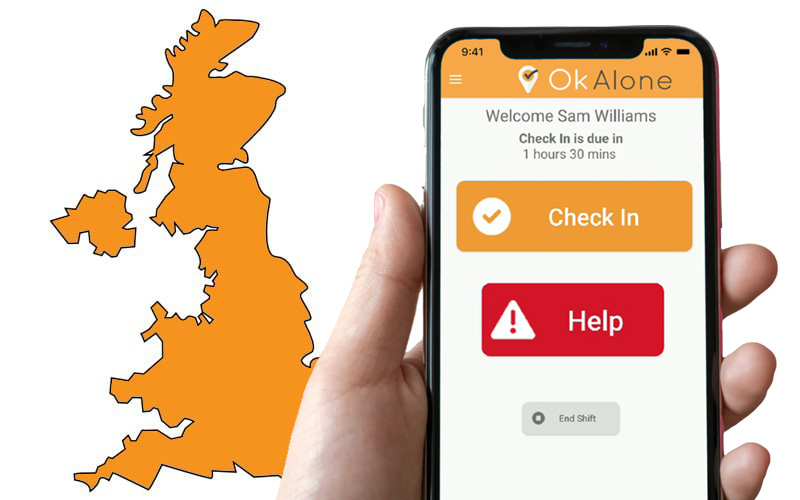Understanding the UK Health and Safety Executive (HSE) and their Legislation, Guidelines and Penalties

Here are the lone working and work alone acts and regulations found in the United Kingdom. This article includes information on lone worker policies and legislation, including guidance from the UK Health and Safety Executive.
The UK Health and Safety Executive (HSE) defines lone workers as “those who work by themselves without close or direct supervision”.
What is the HSE?
The UK Health and Safety Executive or HSE (sponsored by the Department for Work and Pensions) is the body responsible for the encouragement, regulation and enforcement of workplace health, safety and welfare risks in England, Wales and Scotland. HSE guidance advises employers to assess the risks associated with lone working, provide training, and as duty of care, ensure there are systems in place to monitor their lone workers. HSE also places emphasis on the importance of maintaining regular contact with lone workers and providing them with a way to signal for help. They have produced materials for employers of lone workers, (HSE guide to lone working) identifying their legal responsibilities. Within the guide the HSE recommends the implementation of monitoring procedures that include check-ins at pre-agreed intervals with workers.
Monitoring Procedures for Lone Workers
Monitoring Procedures that can be put in place to monitor lone workers (as an effective means of communication) could include:
■ supervisors periodically visiting and observing people working alone;
■ pre-agreed intervals of regular contact between the lone worker and supervisor, using phones, radios or email, bearing in mind the worker's understanding of English;
■ manually operated or automatic warning devices which trigger if specific signals are not received periodically from the lone worker, eg staff security systems; and
■ implementing robust systems to ensure a lone worker has returned to their base or home once their task is completed.
Which Legislation is relevant to Lone Working?
There is no specific lone worker policy in the U.K, however, the primary legislation covering occupational health and safety are; the Health and Safety at Work etc. Act 1974, together with later amendments, and the Management of Health and Safety at Work Regulations 1999.
Employers have a legal obligation under these regulations to assess risks in the workplace and take preventative measures, introducing proper procedures, when risks are identified. The safety legislation recognises that common sense and adequate management practices should lead employers toward reasonable safety policies. Companies should create a robust lone working policy that can be referred to and used as guidance for any employee who works alone. Ideally workers should be given a copy of the policy and it should be displayed in an area where workers can see it if they come to the site/workplace.
The Health and Safety at Work Act 1974 sets out the general duties of employers and employees to their own and each other's safety. These duties are qualified in the Act by the principle of ‘so far as is reasonably practicable'.
General duties of employers to their employees.
(1) It shall be the duty of every employer to ensure, so far as is reasonably practicable, the health, safety and welfare at work of all his employees.
(Although, it really should say 'their' employees.)
Therefore, an employer does not have to take measures to avoid or reduce the risk if they are technically impossible or if the time, trouble or cost of the measures would be grossly disproportionate to the risk. The legal requirement for employers is to look at what the risks are and take sensible safety measures to prevent them.
The Management of Health and Safety at Work Regulations 1999 requires employers, in consultation with employees, to; carry out risk assessments, make arrangements to implement necessary measures, appoint competent people and arrange for appropriate information and training. Employers do need to check that any lone working staff do not have medical conditions that make them unsuitable for working alone.
The main section that applies to employers is Schedule 1, General Principles of Prevention.
(This Schedule specifies the general principles of prevention set out in Article 6(2) of Council Directive 89/391/EEC)(1)
(a) avoiding risks;
(b) evaluating the risks which cannot be avoided;
(c) combating the risks at source;
(d) adapting the work to the individual, especially as regards the design of workplaces, the choice of work equipment and the choice of working and production methods, with a view, in particular, to alleviating monotonous work and work at a predetermined work-rate and to reducing their effect on health;
(e) adapting to technical progress;
(f) replacing the dangerous by the non-dangerous or the less dangerous;
(g) developing a coherent overall prevention policy which covers technology, organisation of work, working conditions, social relationships and the influence of factors relating to the working environment;
(h) giving collective protective measures priority over individual protective measures; and
(i) giving appropriate instructions to employees.
UK legislation that is relevant to the safety of lone workers includes:
- The Health and Safety at Work Act 1974
- The Management of Health and Safety at Work Regulations 1999
- Safety Representatives and Safety Committees Regulations 1977(a) and The Health and Safety (Consultation with Employees) Regulations 1996(b)
- Fire Act 2005
Current Guidelines and Penalties
In 2015 the Sentencing Council published new guidelines aimed at delivering proportional and fair penalties for breeches of legislation that effect the well-being of workers. The new Health and Safety Offences, Corporate Manslaughter and Food Safety and Hygiene Offences Definitive Guidelines came into force on February 1st 2016. It comprises five separate guidelines including offences contrary to sections 33(1)(a) and
33(1)(c), Health and Safety at Work Act 1974 (HSWA 1974); regulation 19(1) of the Food Safety and Hygiene (England) Regulations 2013; regulation 17(1) of the Food Hygiene (Wales) Regulations 2006; regulation 4 of the General Food Regulations 2004; and section 1 of the Corporate Manslaughter and Corporate Homicide Act 2007. The guidelines increased the maximum fines and custodial sentences that can be handed down to employers.
These guidelines impose a sliding scale of fines, designed to ensure that all companies, large or small, receive a penalty that impacts their bottom line to the same degree. Companies with a turnover of more than £50 million can now be fined up to £20 million in cases of corporate manslaughter. In the most severe cases, the legislation also allows for directors to face custodial sentences of up to life imprisonment.
Please see here for the Definitive Guidelines to the Health and Safety Offences, Corporate Manslaughter and Food Safety and Hygiene Offences from the Sentencing Council.
Want to Try the Ok Alone App?
Ok Alone is a lone worker solution that uses a worker's own smartphone to protect their health and safety. The lone worker app connects to a cloud-based dashboard that allows a supervisor to monitor the well being of their workers and get a precise GPS location if a worker is in distress.
Book a Demo Today
Alternatively, get a free trial of the app
Want to try OK Alone? Click the button below and enter your details. It's free and no credit card is required.





